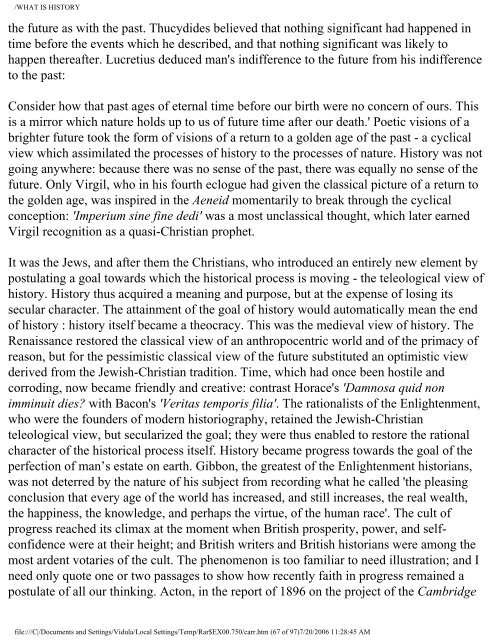What is History / by Edward Hallett Carr - Universal History Library
What is History / by Edward Hallett Carr - Universal History Library
What is History / by Edward Hallett Carr - Universal History Library
Create successful ePaper yourself
Turn your PDF publications into a flip-book with our unique Google optimized e-Paper software.
WHAT IS HISTORY<br />
the future as with the past. Thucydides believed that nothing significant had happened in<br />
time before the events which he described, and that nothing significant was likely to<br />
happen thereafter. Lucretius deduced man's indifference to the future from h<strong>is</strong> indifference<br />
to the past:<br />
Consider how that past ages of eternal time before our birth were no concern of ours. Th<strong>is</strong><br />
<strong>is</strong> a mirror which nature holds up to us of future time after our death.' Poetic v<strong>is</strong>ions of a<br />
brighter future took the form of v<strong>is</strong>ions of a return to a golden age of the past - a cyclical<br />
view which assimilated the processes of h<strong>is</strong>tory to the processes of nature. H<strong>is</strong>tory was not<br />
going anywhere: because there was no sense of the past, there was equally no sense of the<br />
future. Only Virgil, who in h<strong>is</strong> fourth eclogue had given the classical picture of a return to<br />
the golden age, was inspired in the Aeneid momentarily to break through the cyclical<br />
conception: 'Imperium sine fine dedi' was a most unclassical thought, which later earned<br />
Virgil recognition as a quasi-Chr<strong>is</strong>tian prophet.<br />
It was the Jews, and after them the Chr<strong>is</strong>tians, who introduced an entirely new element <strong>by</strong><br />
postulating a goal towards which the h<strong>is</strong>torical process <strong>is</strong> moving - the teleological view of<br />
h<strong>is</strong>tory. H<strong>is</strong>tory thus acquired a meaning and purpose, but at the expense of losing its<br />
secular character. The attainment of the goal of h<strong>is</strong>tory would automatically mean the end<br />
of h<strong>is</strong>tory : h<strong>is</strong>tory itself became a theocracy. Th<strong>is</strong> was the medieval view of h<strong>is</strong>tory. The<br />
Rena<strong>is</strong>sance restored the classical view of an anthropocentric world and of the primacy of<br />
reason, but for the pessim<strong>is</strong>tic classical view of the future substituted an optim<strong>is</strong>tic view<br />
derived from the Jew<strong>is</strong>h-Chr<strong>is</strong>tian tradition. Time, which had once been hostile and<br />
corroding, now became friendly and creative: contrast Horace's 'Damnosa quid non<br />
imminuit dies? with Bacon's 'Veritas tempor<strong>is</strong> filia'. The rational<strong>is</strong>ts of the Enlightenment,<br />
who were the founders of modern h<strong>is</strong>toriography, retained the Jew<strong>is</strong>h-Chr<strong>is</strong>tian<br />
teleological view, but secularized the goal; they were thus enabled to restore the rational<br />
character of the h<strong>is</strong>torical process itself. H<strong>is</strong>tory became progress towards the goal of the<br />
perfection of man’s estate on earth. Gibbon, the greatest of the Enlightenment h<strong>is</strong>torians,<br />
was not deterred <strong>by</strong> the nature of h<strong>is</strong> subject from recording what he called 'the pleasing<br />
conclusion that every age of the world has increased, and still increases, the real wealth,<br />
the happiness, the knowledge, and perhaps the virtue, of the human race'. The cult of<br />
progress reached its climax at the moment when Brit<strong>is</strong>h prosperity, power, and selfconfidence<br />
were at their height; and Brit<strong>is</strong>h writers and Brit<strong>is</strong>h h<strong>is</strong>torians were among the<br />
most ardent votaries of the cult. The phenomenon <strong>is</strong> too familiar to need illustration; and I<br />
need only quote one or two passages to show how recently faith in progress remained a<br />
postulate of all our thinking. Acton, in the report of 1896 on the project of the Cambridge<br />
file:///C|/Documents and Settings/Vidula/Local Settings/Temp/Rar$EX00.750/carr.htm (67 of 97)7/20/2006 11:28:45 AM







